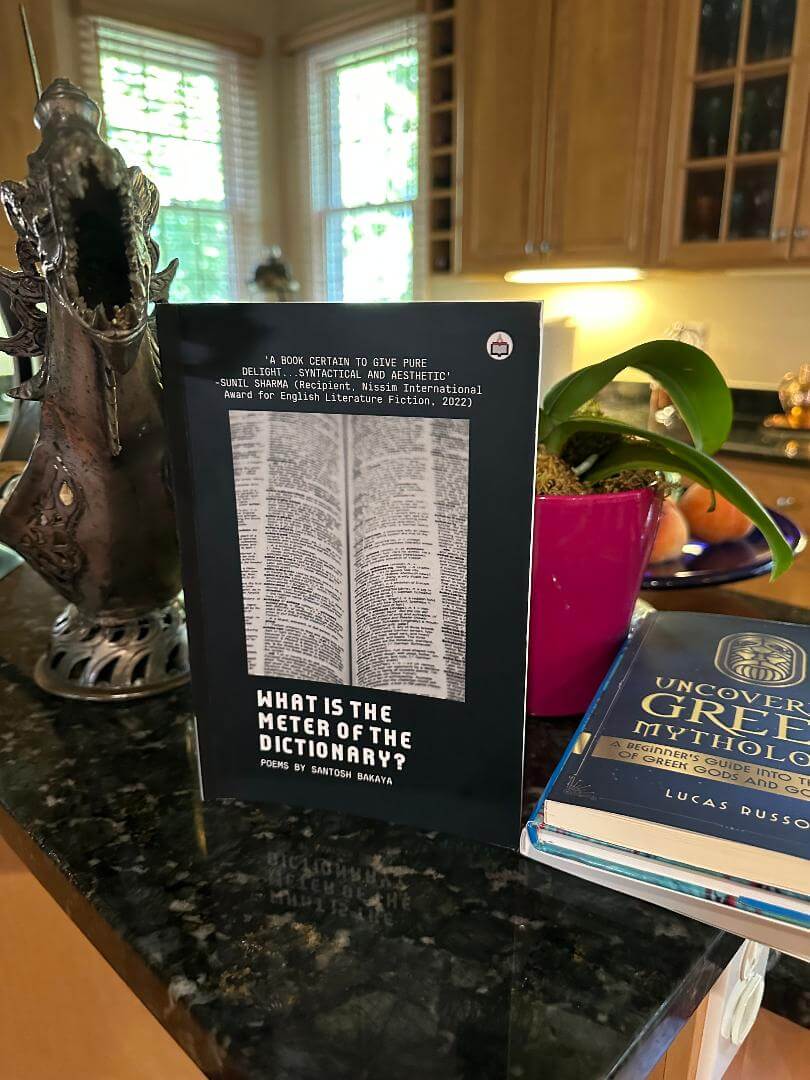Dr Meenakshi opines that Santosh Bakaya’s “What is the Meter of the Dictionary(?)” is a deeply emotional literary experience, resonating with powerful sentiments and personal memories—an exclusive for Different Truths.
Have you ever dived in the ocean and measured its depth in meters? I have! Going through Santosh Bakaya’s What is the Meter of the Dictionary(?) was like diving into the depths of emotions and coming out with gems of her verses. Like Santosh, I, too, have been gripped by Dylan Thomas’s words, especially when she quotes (Acknowledgements), “Do not go gentle into that good night,” – teary-eyed and with lumps in my throat, I visualise that moonless, misty night when Kshitij, my husband next to me with Dylan Thomas’s book in his hands read aloud, “…Though wise men at their end know dark is light …,” with sleep lingering in my eyes, I was listening to him. If only I knew then that I had him next to me for such a short time, I would have clutched to him closely! Now, my mind and soul echo with Santosh’s lines (What is the Meter of the Dictionary):
Pray, tell me, why did you die at such a young age?
Why didn’t you rage, rage
Rage against the dying of the light…”
Every verse of hers in this collection has affected me with different emotions.
Every verse of hers in this collection has affected me with different emotions. In (Come Back) “Come back, come back, the waves echoed…” – It took me back to my own childhood, and I felt the craving for the years gone by, and all I could say:
Lips sealed, I look around wistfully, carefully tucking a strand of gray hair behind my ear, a restless heart beating to the notes of that long-lost song, So sublime, so soothing.
In most of the poems in this collection, you see a heartache, a craving for what is not, such as in her verses, They Say There is Autumn in My Land, Grass and Heather, and many others. In The Crack of Every Summer Dawn, she says:
So many years just gone in the blink of an eye. But those birds still come, humming some new songs, in different tones and tenors, every summer morn, resurrecting my comatose soul I am once again on a roll.
Her opaque writing style spreads this imagery throughout her verses in this book.
Santosh creates beautiful imagery with her words. Her opaque writing style spreads this imagery throughout her verses in this book. Kashmir is very much on her mind. In I Am Home, she recalls:
I find myself perched on a log, sun-drenched and bright. There are vistas of beautiful meadows, thick woods, Undulating hills and farmers working with grit. Oodles of love permeate the surroundings, a sweet fragrance spreads. … The flamboyant curtains of shikaras rustle happily. I am home.
I love each poem in this collection – her words directly speak to me and trigger strong emotional responses. I find a lot of parallels in her composition and style with the writings of many titans of the literary world, like Ralph Emerson, Walt Whitman, and Henry David Thoreau, when she talks about the pristine beauty of nature and uses them symbolically in conveying the messages. Despite all the heartaches and cravings, she consoles herself in understanding the importance of carpe diem – each moment in life has its value. In Healing Hues, she comments, “My blues vanish, and right before my eyes …once again create new hues – sublime and healing.”
I met Santosh only through her verses and always visualised her as a funny, humorous, and hilarious poet. Somehow, I find a different tone of writing in this collection. I agree with Dr Sunil Sharma, another one of my favourite writers, in what he says about her, “As restive as the creator, these poems burst with a heady mix of raw energies, emotions, ready to leap at you out of the confines, both verbal and spatial – a rare feat of creativity.”
I love, love, love this book, and Ah, “How I wish I could chirp like you too.” A huge congratulations, Santosh, on this lovely creation.
Finally, thanks to Sudarshan Kcherry for publishing such a gem of a book.
Cover image sourced by the reviewer





 By
By
 By
By
 By
By
 By
By
When poets write about poets, pearls emerge from the ocean depths. Lovely review, Meenu.
Thank you for the exquisite glimpses into Santosh Bakaya’s beautiful verses a writer par excellence.